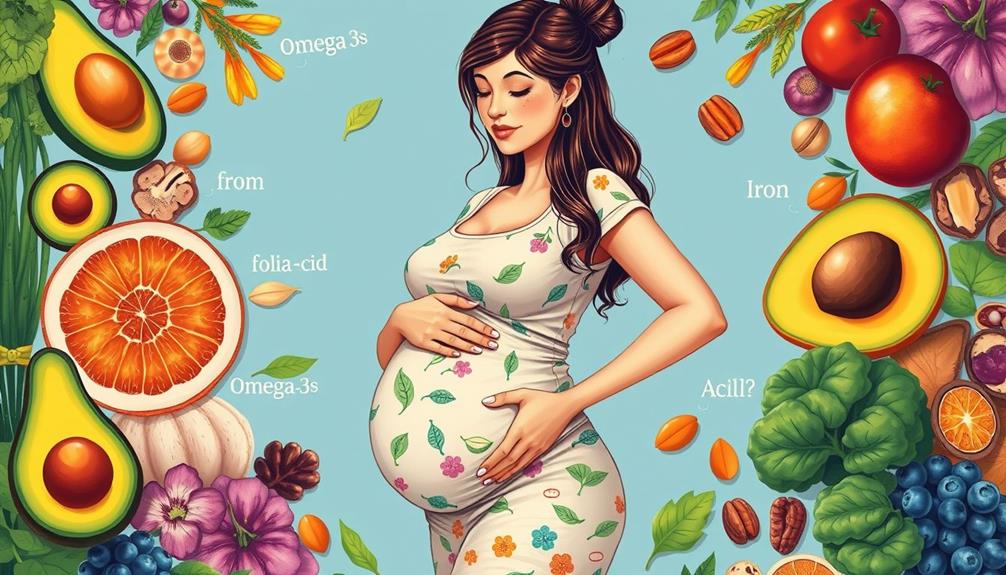Nutrition is essential for your baby's development, shaping their growth and future health. Many myths suggest you need to "eat for two" or focus solely on milk. In reality, a balanced diet rich in key nutrients like folate, choline, calcium, and iron is what matters most. These nutrients help prevent complications and support brain development. Breastfeeding is important too, providing tailored nutrition that adapts as your baby grows. Understanding the facts around nutrition can empower you to make informed choices. Keep exploring to uncover more insights for the best maternal and baby health.
Key Takeaways
- A balanced diet rich in key nutrients during pregnancy supports optimal fetal growth and reduces complications like low birth weight and gestational diabetes.
- Essential nutrients such as folate, choline, calcium, and iron are critical for preventing developmental issues and ensuring healthy fetal development.
- Myths like "eating for two" mislead women; only a modest caloric increase is necessary during pregnancy, focusing on quality over quantity.
- Breastfeeding for at least six months offers essential nutrients and antibodies, lowering the risk of chronic conditions in infants.
- Engaging with healthcare professionals for nutritional guidance is crucial, as many women rely on family myths rather than accurate information.
Importance of Nutrition During Pregnancy
Nutrition during pregnancy is absolutely essential for both you and your developing baby. A healthy diet rich in key nutrients like folate, choline, calcium, and iron plays an important role in supporting your baby's growth and development. These nutrients are essential for processes such as neural tube formation and bone health.
Additionally, maintaining a balanced diet can optimize your overall health and reduce pregnancy-related complications, such as those related to menopause management. During the first trimester, you won't need extra calories, but in the second and third trimesters, your energy intake should increase by 340 and 450 calories daily, respectively. This highlights the importance of focusing on nutrient quality rather than just quantity.
Establishing healthy eating habits during pregnancy can greatly reduce the risk of complications like gestational diabetes and hypertension, contributing to long-term maternal health.
It's also important to reflect on prenatal supplements, as they can fill in any nutritional gaps and improve birth outcomes. Remember, any deficiencies in your nutrition can lead to serious birth complications, including low birth weight and developmental delays.
Prioritizing a well-rounded diet and adequate supplementation guarantees both you and your baby thrive during this critical time. Your commitment to proper nutrition now sets the stage for a healthier future for your child.
Common Myths About Baby Nutrition

You might believe that eating for two during pregnancy means loading up on extra calories, but that's not the case; moderation is key.
In fact, safe second trimester workouts can also play a significant role in maintaining a healthy weight during pregnancy.
Misunderstandings about milk consumption can also lead to confusion about when to introduce whole milk to your baby's diet.
Plus, the idea that babies need a high-fat diet for growth can obscure the importance of a balanced approach to nutrition.
Eating for Two Fallacy
The "eating for two" myth is a pervasive misconception that can lead many pregnant women to overindulge in calories. In reality, your caloric needs only slightly increase during pregnancy—about 200-250 extra calories per day in the second and third trimesters. This emphasizes the importance of focusing on nutrition during pregnancy over calorie quantity.
Instead of doubling your food portions, prioritize a balanced diet of nutrient-dense foods rich in vitamins and minerals. This approach supports healthy growth for both you and your baby while helping to avoid excessive weight gain, which can lead to complications like gestational diabetes.
Here's a quick comparison of the myth versus the facts:
| Myth | Fact |
|---|---|
| You must "eat for two." | Only a slight increase in calories is needed. |
| All calories are equal. | Focus on nutrient-dense foods for essential nutrients. |
| First trimester requires more calories. | Most women need no extra calories initially. |
| Overeating is harmless. | It can lead to serious pregnancy complications. |
| Weight gain is always beneficial. | Balanced weight gain is essential for health. |
Milk Consumption Misunderstandings
Understanding what to feed your baby can be overwhelming, especially with so many myths surrounding milk consumption. One common misconception is that introducing whole milk before 12 months is safe. In reality, infants need the specific nutrients found in breast milk or formula during their first year. Whole milk is recommended for babies from 12 months to 2 years, as it's vital for brain development, supplying healthy fats, calcium, and vitamin D.
Another myth is that milk should be the main focus of your baby's diet. Instead, a varied diet, including pureed fruits and vegetables, is essential for ideal nutrition. While milk consumption provides important nutrients, it shouldn't replace other food sources.
Moreover, many parents overemphasize fat intake for babies, thinking more is better. Balance and moderation are key to avoiding nutrient deficiencies and promoting healthy growth.
Fat Intake Confusion
During the first year of life, confusion often arises around fat intake in babies. Many parents worry about how much fat their infants should consume, but it's important to understand that healthy fats are necessary for growth and brain development.
Fatty acids provide the energy babies need and support the formation of neural tissue, which is critical during this rapid developmental phase.
However, moderation is key. While infants require fats for a balanced diet, excessive fat can lead to nutrient deficiencies and hinder physical milestones, like walking.
Introducing a variety of foods early on helps shape healthy eating habits and reduces the risk of favoring unhealthy fatty options later.
For children aged 12 months to 2 years, whole milk is recommended. It offers necessary fats, calcium, and vitamins that support ideal growth and development.
Key Nutrients for Fetal Development

Ensuring proper nutrition is essential for ideal fetal development, as key nutrients play a significant role in your baby's growth and health. Among these, folate is crucial, helping to prevent neural tube defects. Aim for at least 600 mcg daily from dark leafy greens and fortified grains.
Additionally, incorporating plant-based options can provide a variety of nutrients while supporting a vegan lifestyle. Choline is another important nutrient, necessary for fetal brain development. You should consume at least 450 mg daily, which you can find in eggs, meat, and fish.
Calcium is vital for developing your baby's bones and teeth, requiring about 1,000 mg each day from dairy products and fortified foods.
Additionally, increasing your intake of iron is crucial to support your growing fetus and prevent anemia; aim for 27 mg daily from lean meats, legumes, and spinach.
Lastly, don't forget about omega-3 fatty acids, especially DHA, which are essential for fetal brain and eye development. Experts recommend 8-12 ounces of seafood per week or supplements if you avoid seafood.
Meeting these nutritional needs in your pregnancy diet will help foster ideal conditions for your baby's development.
Impact of Maternal Diet on Baby

Maternal nutrition directly shapes your baby's growth and development throughout pregnancy. A well-balanced diet is essential, as it provides necessary nutrients that support fetal growth and reduce the risk of complications. Nutritional gaps can lead to issues like low birth weight and developmental challenges.
| Nutrient | Importance |
|---|---|
| Folate | Prevents neural tube defects |
| Omega-3 Fatty Acids | Supports brain development |
| Calcium | Essential for bone health |
Excessive weight gain can increase the risk of gestational diabetes, which may complicate delivery and affect your baby's health. The first 1000 days, from conception through the first two years, are critical in establishing a foundation for lifelong health. During this period, your diet can markedly influence your child's future well-being.
It's essential to focus on a balanced diet rich in nutrients like choline and iron to support your baby's overall health. Poor maternal nutrition not only affects fetal growth but also increases the likelihood of chronic diseases later in life. Prioritizing your nutrition is an investment in your baby's future.
Breastfeeding and Nutritional Needs

Breastfeeding stands as one of the most essential choices you can make for your baby's health and development. It provides the perfect balance of fats, proteins, and carbohydrates tailored to your infant's needs. Exclusive breastfeeding for the first six months is critical, as it considerably lowers the risk of infections and chronic conditions later in life.
Additionally, engaging in family activities that promote creativity can enhance a nurturing environment, positively impacting your baby's overall development and well-being, as highlighted in family activities that promote creativity.
Your maternal nutrition plays an important role during this period. As a lactating mother, you'll need additional calories and specific micronutrients, such as vitamin D, calcium, and omega-3 fatty acids, to support both your health and the quality of your breast milk.
The composition of breast milk adapts to meet your growing baby's changing needs, ensuring they receive essential nutrients and antibodies that help bolster their immune system.
Research shows that breastfeeding for at least six months is linked to a lower risk of obesity, type 2 diabetes, and cardiovascular diseases in childhood. By prioritizing breastfeeding and your nutritional needs, you're giving your baby the best possible start in life, setting the stage for a healthier future.
Misconceptions Around Weight Gain

Weight gain during pregnancy is often surrounded by myths that can lead to confusion and unhealthy choices. One common misconception is that you need to "eat for two," resulting in excessive weight gain. In reality, only a modest increase in caloric intake is necessary.
It's important to focus on balanced nutrition to support both your health and the development of your baby. Here are some key points to reflect on:
- Depending on your trimester, you may need just 200-450 additional calories daily.
- Excessive weight gain can raise the risk of gestational diabetes, hypertension, and delivery complications, so balanced nutrition is vital.
- Weight gain recommendations vary based on your pre-pregnancy body mass index (BMI), highlighting the need for personalized dietary guidance.
Surprisingly, only 32% of women gain weight within the recommended ranges during pregnancy. This gap in adherence to nutritional guidelines can greatly impact health outcomes for both mother and baby.
Instead of fixating on weight, focus on nutrient-dense snacks and meals. This approach helps manage gestational weight gain while ensuring you meet your nutritional needs during pregnancy.
Sources of Nutritional Knowledge

Steering through the domain of nutritional knowledge during pregnancy can be challenging, especially with so much conflicting information available. Many pregnant women tend to rely on family and friends as their primary sources of nutritional knowledge. Unfortunately, this often perpetuates myths instead of providing accurate information. In fact, a study revealed that only 45% of women cited healthcare professionals as their source of nutritional guidance. This gap highlights a significant need for more professional input during this important time.
Additionally, understanding the impact of mental health on overall well-being can enhance nutritional choices; for instance, mental health support is essential for those at risk of depression, which may affect dietary habits.
Awareness and educational background play significant roles in nutritional practices. Older women and those from higher-income families typically exhibit greater knowledge about nutrition. Yet, despite this, fewer than half of pregnant women use folic acid before or during pregnancy, showcasing a lack of awareness about essential supplements.
The prevalence of myths, such as the idea of "eating for two," further emphasizes the necessity for targeted health education. By seeking reliable sources of nutritional knowledge, you can make informed decisions that positively impact your health and that of your baby.
Engaging with healthcare professionals and reputable educational resources can help demystify nutrition and empower you during this essential period.
Strategies for Healthy Eating During Pregnancy

Healthy eating during pregnancy is important for both you and your developing baby. To guarantee good nutrition, focus on a balanced diet that includes a variety of food groups. Incorporating diverse and nutrient-rich foods can't only support your health but also align with the principles of a healthy lifestyle.
Here are three strategies to help you maintain a healthy diet during this critical time:
- Prioritize nutrient-dense foods: Incorporate more fruits, vegetables, whole grains, and healthy fats into your meals. These foods provide essential nutrients like folic acid, calcium, and iron, which are necessary for your baby's growth and brain development.
- Increase your caloric intake wisely: During the second and third trimesters, you should consume an additional 340-450 calories daily. However, it's important to emphasize quality over quantity. Choose nutritious snacks instead of empty calories.
- Stay informed through antenatal care: Regular visits to your healthcare provider can help you receive personalized dietary advice and debunk common myths about pregnancy nutrition.
Frequently Asked Questions
What Role Does Nutrition Play in the Development of an Unborn Child?
Nutrition plays a crucial role in your unborn child's development. By ensuring you get essential nutrients like folate, iron, and omega-3 fatty acids, you're supporting their brain and bone growth.
During pregnancy, your nutritional needs increase, so it's important to focus on quality over quantity. A balanced diet can help prevent complications and promote healthier outcomes for both you and your baby.
What Is the Role of Nutrition in Infant Development?
You might think that once a baby is born, nutrition isn't as essential, but that couldn't be further from the truth.
In fact, proper nutrition plays an important role in infant development. It fuels growth, supports brain development, and strengthens the immune system.
By providing essential nutrients through breastfeeding or formula, you're setting the stage for healthy milestones.
How Does Nutrition Affect an Infant's Intellectual Development?
Nutrition plays an essential role in your infant's intellectual development. When you provide key nutrients, like omega-3 fatty acids and folate, you support brain growth and cognitive function.
Exclusively breastfeeding for the first six months offers important nutrients that enhance both physical and mental development. Plus, exposing your baby to various flavors can promote healthier eating habits later.
What Is the Role of Nutrition in Child Growth?
Nutrition plays a critical role in your child's growth. When you provide a balanced diet rich in essential nutrients, you're fueling their development physically and mentally.
Key nutrients like protein, vitamins, and minerals support everything from bone growth to brain function. By ensuring they're getting enough fruits, vegetables, and healthy fats, you're setting them up for a healthy future.
Conclusion
In summary, prioritizing nutrition during pregnancy is essential for your baby's development. Did you know that babies born to mothers who consume a balanced diet are 30% less likely to face developmental delays? By debunking common myths and focusing on key nutrients, you can guarantee your little one gets the best start in life. Embrace healthy eating habits and stay informed to nurture your baby's potential from the very beginning. Your choices truly make a difference!










